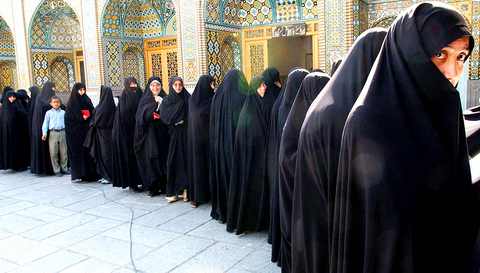Elections opened yesterday in Iran to elect a successor to President Khatami, who cannot run for a third consecutive term.
Of 68 million Iranians, almost 47 million are over the age of 15 and so eligible to vote at more than 40,000 polling stations throughout the country until 7:30pm.
However, it was expected that the voting period would be extended for three more hours.

PHOTO: AP
Due to the recent spate of bombings, more than 20,000 police were on hand to provide security at the polling stations.
The interior ministry said that the army and the air force would aid the police on election day.
According to the latest police report, no incidents were registered in the country in the first three hours of the elections.
Iranian police Chief Morteza Talaie said yesterday that his forces were in full control of security.
Iran's intelligence chief Ali Yunessi told state television that the reports he has so far gained from Tehran and the provinces indicate that "there is an unpredictable enthusiasm among the people."
European diplomats who are in Tehran have been allowed by the interior ministry to visit some of the polling stations, said that the turnout so far was beyond their expectations.
President Khatami yesterday expressed hope that the new Iranian president would be elected in the first round with no need for a second one.
Khatami told reporters after casting his vote in Tehran that the Interior Ministry was however prepared to hold the second round if necessary as scheduled on June 24.
The president further said that elections are the most suitable platform for the people to involve themselves in state decisions and called on the people to avail themselves of this democratic opportunity.
Due to the tight security, Khatami's voting venue was changed from a polling station in northern Tehran to the election headquarters in the interior ministry.
Meanwhile, the leading candidate Akbar Hashemi-Rafsanjani yesterday predicted a victory for himself in the first round.
Talking to reporters after casting his vote in Tehran, Rafsanjani doubted that the elections would reach the second round.
The favorites among the seven candidates are the moderate cleric Rafsanjani, reformist Mostafa Moein and the conservative ex-police chief Mohammad Baqer Qalibaf. Qalibaf told reporters he believes a second round of voting will be necessary.
Iranian Supreme Leader Ayatollah Ali Khamenei said yesterday that every vote cast will strengthen the country's Islamic establishment.
Khamenei, one of the first Iranians to go to the polls, said that the votes would also discourage "our enemies" who try to persuade world public opinion that Islam and democracy are not compatible.

Auschwitz survivor Eva Schloss, the stepsister of teenage diarist Anne Frank and a tireless educator about the horrors of the Holocaust, has died. She was 96. The Anne Frank Trust UK, of which Schloss was honorary president, said she died on Saturday in London, where she lived. Britain’s King Charles III said he was “privileged and proud” to have known Schloss, who cofounded the charitable trust to help young people challenge prejudice. “The horrors that she endured as a young woman are impossible to comprehend and yet she devoted the rest of her life to overcoming hatred and prejudice, promoting kindness, courage, understanding

US President Donald Trump on Friday said Washington was “locked and loaded” to respond if Iran killed protesters, prompting Tehran to warn that intervention would destabilize the region. Protesters and security forces on Thursday clashed in several Iranian cities, with six people reported killed, the first deaths since the unrest escalated. Shopkeepers in Tehran on Sunday last week went on strike over high prices and economic stagnation, actions that have since spread into a protest movement that has swept into other parts of the country. If Iran “violently kills peaceful protesters, which is their custom, the United States of America will come to

‘DISRESPECTFUL’: Katie Miller, the wife of Trump’s most influential adviser, drew ire by posting an image of Greenland in the colors of the US flag, captioning it ‘SOON’ US President Donald Trump on Sunday doubled down on his claim that Greenland should become part of the US, despite calls by the Danish prime minister to stop “threatening” the territory. Washington’s military intervention in Venezuela has reignited fears for Greenland, which Trump has repeatedly said he wants to annex, given its strategic location in the arctic. While aboard Air Force One en route to Washington, Trump reiterated the goal. “We need Greenland from the standpoint of national security, and Denmark is not going to be able to do it,” he said in response to a reporter’s question. “We’ll worry about Greenland in

PERILOUS JOURNEY: Over just a matter of days last month, about 1,600 Afghans who were at risk of perishing due to the cold weather were rescued in the mountains Habibullah set off from his home in western Afghanistan determined to find work in Iran, only for the 15-year-old to freeze to death while walking across the mountainous frontier. “He was forced to go, to bring food for the family,” his mother, Mah Jan, said at her mud home in Ghunjan village. “We have no food to eat, we have no clothes to wear. The house in which I live has no electricity, no water. I have no proper window, nothing to burn for heating,” she added, clutching a photograph of her son. Habibullah was one of at least 18 migrants who died